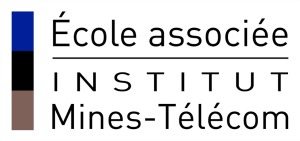ENIB and ENSSAT join IMT network of partner institutions
On January 31st 2014, the École Nationale d’Ingénieurs de Brest (ENIB) and the École Nationale Supérieure des Sciences Appliquées et de Technologie (ENSSAT), affiliated to the University of Rennes 1, joined the network of institutions associated with IMT. These partnerships reinforce existing cooperation agreements focused on training, research and innovation.

From left to right : Jean-Christophe Pettier, Director of Enssat , Jean-Claude Jeanneret,Managing Director of IMT and Jacques Tisseau, Director of Enib
Extending our partnership programs
 ENIB, geographically close to Télécom Bretagne, has been working hand-in-hand with IMT’s Brittany outpost for many years. In 2012, the participation of 30 ENIB lecturers and researchers in the CNRS Lab-Sticc laboratory, an initiative with which Télécom Bretagne is closely involved, provided an opportunity to reinforce our collaborative efforts in the field of information and communication science and technologies. Both institutions are also jointly involved in initiatives such as Forum Ouest Avenir, the 100 Women/100 Professions scheme and the Arfitec Forum (a bilateral initiative piloted jointly by France and Argentina).
ENIB, geographically close to Télécom Bretagne, has been working hand-in-hand with IMT’s Brittany outpost for many years. In 2012, the participation of 30 ENIB lecturers and researchers in the CNRS Lab-Sticc laboratory, an initiative with which Télécom Bretagne is closely involved, provided an opportunity to reinforce our collaborative efforts in the field of information and communication science and technologies. Both institutions are also jointly involved in initiatives such as Forum Ouest Avenir, the 100 Women/100 Professions scheme and the Arfitec Forum (a bilateral initiative piloted jointly by France and Argentina).
ENSSAT has been an academic and scientific partner of Télécom Bretagne for a decade, particularly by hosting  researchers specializing in photonics at its premises in Lannion, and through active involvement of Mines-Télécom academics in courses given at ENSSAT. In 2010, ENSSAT joined the ‘Telecom INT’ competitive entry examination, opening up a new relationship with Télécom SudParis which is responsible for organizing the examination and holding the admissions interviews for ENSSAT at its Evry campus. Starting this academic year (2013-2014) students in their final year of engineering studies at ENSSAT can now enroll for the ICT & Healthcare Master’s degree offered by IMT in Montpellier.
researchers specializing in photonics at its premises in Lannion, and through active involvement of Mines-Télécom academics in courses given at ENSSAT. In 2010, ENSSAT joined the ‘Telecom INT’ competitive entry examination, opening up a new relationship with Télécom SudParis which is responsible for organizing the examination and holding the admissions interviews for ENSSAT at its Evry campus. Starting this academic year (2013-2014) students in their final year of engineering studies at ENSSAT can now enroll for the ICT & Healthcare Master’s degree offered by IMT in Montpellier.
Over the past four years, ENIB and ENSSAT have joined forces with Télécom Bretagne and INSA Rennes to offer a Master’s degree in Photonics, with an advanced program taking in optics, telecommunications and optical nanotechnologies and offered simultaneously in Brest, Lannion and Rennes. As leading players in the field of digital innovation, these two new partners of IMT are also members of the Labex schemes Comin Labs and IRT B-Com, as is Télécom Bretagne.
New perspectives for IMT and its partner schools
For Guy Cathelineau, President of the University of Rennes 1, and Jean-Christophe Pettier, ENSSAT Director, “For ENSSAT, a division of the University of Rennes 1, becoming a partner of IMT is an opportunity to reinforce and build on the collaborative initiatives developed in recent years with Télécom Bretagne and Télécom SudParis. What’s more, this partnership opens up the possibility of closer relationships with the Institut-Télécom’s other graduate schools and partners, focused on engineering training, research and innovation. Establishing ENSSAT’s position within a group of leading academic institutions in the fields of digital technologies, energy transition and management confirms the reputation of our Lannion technopolis as a hub of innovation and a thriving center of technological innovation.”
For Jacques Tisseau, Director of the École Nationale d’Ingénieurs de Brest, “the partnership between ENIB and the Institut Mines-Télécom is an opportunity for us to build further on our rich, multi-faceted relationship with Télécom Bretagne, opening up potential avenues for future collaborations at both national and international levels. Educational engineering, international cooperation, research and innovation will remain at the heart of all such future development. In addition to a closer collaboration in terms of facilities, this is also a chance for ENIB to promote the abilities of its engineering graduates, equipped with the skills needed to identify new sources of efficiency and optimization, while dealing with the various constraints that shape the evolution of our society, be they economic, human or environmental.”
For IMT, expanding this network of partner institutions is a way of further expanding the group’s national coverage and reiterating our commitment to the economic development of our regions. As Jean-Claude Jeanneret, Managing Director of IMT, explains: “On the one hand, this further cements our position as France’s leading group of engineering and management schools: we now have 13 associated partner institutions, establishing close connections with almost every region of France. On the other hand, these partnerships allow us to get closer to innovative SMEs interested in collaborative research and potentially recruiting our young graduates.”

















